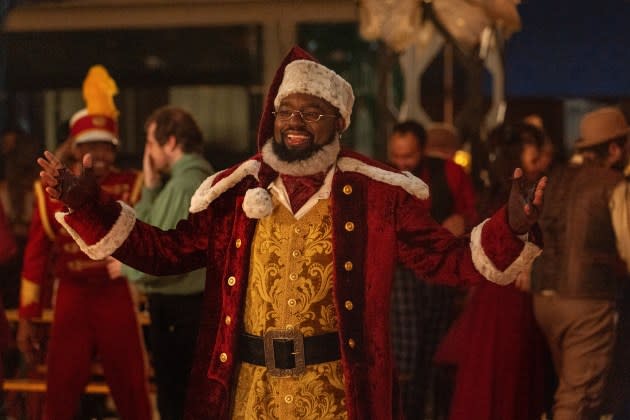‘Dashing Through the Snow’ Review: Lil Rel Howery Plays a Hustler Who May Be Santa in One of Those Christmas Trifles That’s Hard to Resist

In “Dashing Through the Snow,” Lil Rel Howery has the off-the-cuff funk energy of a hustler who’s so quick that you believe his spiel before you’ve had the chance to outthink it. The whole issue of believing is key to the movie, since Howery plays Santa Claus — or, perhaps, a petty criminal who’s pretending to be Santa Claus. The character calls himself Nick, and he’s dressed as a variation on the old-school Victorian Santa: half-frame glasses, a coat festooned with gold buttons and paramilitary shoulder flaps, a vest of gold finery, along with a few token bits of street cool (pearl earring, two-tone beard, fingerless leather gloves).
Howery’s line readings sound improvised, and that’s a good thing. He’s the ebullient, fast-talking spark plug of a formula comedy with a cheap engine, though one that putters along harmlessly enough. Not so long ago, there were maybe three or four Christmas movies per holiday season. Now, in the streaming era, we have the Christmas-movie-industrial complex. They roll off the assembly line by the dozens, and most of them have a strikingly similar tone, derived from around the time that Hollywood was making comedies like “Jingle All the Way” (1996). It’s a tone at once silly, synthetic, and cynical, dunked in the excesses of the consumer culture, but it always builds up to a heartwarming way of saying that Christmas still has soul.
More from Variety
'Vacation Friends 2' Review: With Sequels Like This, Who Needs Enemies?
Teyonah Parris on Transforming Into a 'Hood Superhero' for Netflix's 'They Cloned Tyrone'
Eddie Garrick (Christopher “Ludacris” Bridges), the hero of “Dashing Through the Snow,” is a 40ish Atlanta social worker who is separated from his wife, Allison (Teyonah Parris), and is trying to spend a quality Christmas Eve with their daughter, Charlotte (Madison Skye Validum). Eddie wants to win Allison back and isn’t doing a good job of it. He’s got a pathology about Christmas (because his own folks broke up on Christmas 30 years ago, after he wrote Santa a letter asking for them to stay together). And his antsiness about that sacred day is part of his problem. It’s why Ludacris, who has become a winning actor, invests Eddie with a touch of forlorn sheepishness.
Eddie fastens onto Nick because he thinks that Nick is a disturbed derelict, and that it’s his duty to help him. The joke of the movie, which isn’t a bad one in its “Miracle on 34th Street” meets “Barbershop” with overbright lighting way, is that every time Eddie calls Nick the delusional scoundrel he thinks he is, Nick looks at him with incredulous eyes and says something like, “You really don’t believe.” This is after flimflamming him like the overseer of an illegal card game.
Nick tries to summon reindeer with a clicker, and his flatulence smells like cinnamon; he is most definitely either Santa Claus or certifiable. But beyond his royal red regalia, he has a secret weapon, which is also the movie’s. He keeps stopping adults in their tracks by telling them about some gift they got when they were a kid, and describing what it meant to them. How could he know all that stuff? In its way, the movie takes you back: to that Christmas present you still remember, the one that touched a chord in you and meant everything.
Eddie, meanwhile, is the middle-class Scrooge who has to find his faith. Standing in his way are the movie’s villains: a corrupt congressman (Oscar Nuñez) who wants to shut down the local homeless shelter, and his trio of burglar stooges, who are like the meanies in “Home Alone” minus the jokes. “Dashing Through the Snow” was directed by Tim Story, from a script by Scott Rosenberg, and Story, the director of “Barbershop,” “Ride Along,” and, most recently, the witty semi-satirical slasher movie “The Blackening,” knows how to humanize a formula. “Dashing Through the Snow” is a tinsel-brained cartoon of a movie, but it’s spanked along by hip-hop chestnuts like Run-DMC’s “Christmas in Hollis,” and it puts a fresh groove on holiday-movie tropes that, for too long, have been the province of white-bread suburbia. It should have been called “Blingle All the Way.”
Best of Variety
Sign up for Variety’s Newsletter. For the latest news, follow us on Facebook, Twitter, and Instagram.

 Yahoo News
Yahoo News 